- Home
- Jan-Philipp Sendker
The Far Side of the Night Page 9
The Far Side of the Night Read online
Page 9
“Christine,” Paul whispered suddenly. “Are you awake?”
“Yes, I thought you were asleep,” she replied.
“I can’t sleep.”
They lay next to each other in silence for a few moments.
“You were whimpering in your sleep. Did you have a nightmare?”
“Yes.”
“I’m sorry.”
He was sorry. How easy it was to say the words. He should have taken better care of David then. How could he have taken his eyes off him for even a few seconds in a strange place? In a hotel foyer. Irresponsible. Her accusations might be unjustified, but she was unable to quell the rage she felt towards him. It was his fault.
Christine felt old fears, ones that she had thought long dead, rising from their graves. Once more she saw the five-year-old cowering under the kitchen table while the Red Guards stormed up the stairs. Her father crouching on the windowsill. Like a fat black crow about to stretch its wings. He leapt before they could grab him.
She saw herself swimming in the sea by her mother’s side, escaping to Hong Kong. Six adults and four children. The youngest of them disappeared first. The child simply went under without making a sound. And the parents kept on swimming. Then the second youngest went. She would have been the next in line. Her strength was ebbing. Some of them were praying out loud as they swam. She wasn’t.
A fishing boat rescued them.
Over the years the memories had faded, but what remained was the feeling of boundless fear and loneliness.
And now it had returned: the totality of fear. There was no other feeling that consumed a person so completely, she thought. Nothing that makes slaves of us like fear does. Not grief. Not joy. Not even love.
Christine wanted to get out of this room, to get out of this village. She should never have come to this farmhouse. This was a trap. How long would it take before the police found them? One more day? Two more? Then what? What would happen to David? Would they be able to defend themselves? Her mind circled round and round these questions. She grew dizzy, and felt like throwing up.
“Where are you going?” Paul asked, concerned.
“I can’t stand the darkness any longer,” Christine said. “I’ll sit in the living room for a while.”
“Shall I come with you?”
“No,” she said curtly. “Stay with David instead, in case he wakes.”
XII
Da Lin was woken by the sound of his grandfather’s snoring. He turned him onto his side; that normally helped, but it made no difference tonight.
He heard the woman crying in the next room. He waited to see if his grandfather would stop snoring. After a while, he picked up his blanket and slipped into the living room to lie down on one of the sofas.
The woman was huddled on one of them.
“I’m sorry. Did I wake you?” she asked in a worried voice.
He shook his head. “My grandpa snores so loudly.”
She answered with an exhausted smile.
Da Lin was amazed at how easily the sentence had come to him.
My grandpa snores so loudly. Five words that had slipped out of him. Just like that. He wondered if he should regret it, but strangely he didn’t. Maybe he even felt quite the opposite.
He still had no idea who these strangers were, what they wanted or how long they were staying. Grandpa had said they came from Hong Kong and needed help urgently. The rest didn’t concern him.
He had been asking himself why they had to come into hiding here. They must not have many friends, since they needed help from Grandpa and him.
The woman was constantly worried about her child. Even while playing hide-and-seek! She had grown almost hysterical because her son had disappeared. That was the point of the game. She had really thought she wouldn’t see him again. He had no idea why she burst into tears when she found her son. He didn’t care anyway, but he had felt sorry for her. He didn’t know why, but from that moment on, he had begun to like her. He was still not sure about the man.
He sat down on the other sofa and noticed that the woman was shivering.
“Are you cold?”
“No.”
Da Lin could see that was not true. He got up and fetched a blanket from the closet in the hall. It was so dirty that he put it back and offered her his blanket instead.
“No, thank you. I’m not cold.”
He continued holding the blanket out to her.
“Don’t you need it?”
“No,” he said, gesturing at the long trousers and long-sleeved jersey that he wore to sleep.
“Thank you,” she said. “You’re very kind.”
Da Lin could not remember who had last called him “kind”. Probably not his mother; she seldom used the word. Certainly not Grandpa; he never said it. Maybe Grandma or his father. He was not sure.
“Don’t you go to school ever?”
He shook his head.
“Why not?”
He could tell her about Mr. Wang, Da Lin thought, the teacher who hit his hands with a ruler until they bled whenever he wrote a Chinese character incorrectly. That happened often. Or he could tell her about the forty other children in the cramped classroom, who made fun of him at break time because of that, and boasted about their fathers beating his father to death.
He could not stand being near them. He found them all horrible, without exception. He had thrown up every day in school. One day he simply stopped going, and no one had asked after him. They were probably as happy not to see him as he was not to see them.
Instead of replying, he shrugged and hoped she would stop asking questions.
“I didn’t like going to school either.” It was cold, so she pulled the blanket up to her chin.
“Why not?”
“Probably for the same reasons as you. I didn’t like the teachers and they didn’t like me. Also, I had no friends.”
“None at all?”
“No.”
“Why not?”
She gave him a pensive look and repeated his question. “Why didn’t I have any friends? I’ve often thought about that. I always had the feeling that there was an invisible wall between me and the others, separating us. We saw each other but we never touched each other. We heard what each other said, but we didn’t understand each other. People were around me but were not close to me. Do you understand what I mean?”
Da Lin nodded. If only she knew how well he understood what she meant. He had just not been able to put it into words.
“Is it still like that?”
“What?”
“The wall.”
She hesitated before replying, looking at him closely. “No, it’s not like that any more. The feeling passes.”
“By itself?”
“You’re a clever boy,” she replied.
Da Lin laughed shyly. No one had ever said that to him, and he did not know what she meant exactly by it, nor if that was the answer to his question.
“By itself? I’m not sure,” she said. “I haven’t thought about it before. I think with some people, yes. But not with others.”
He would have liked to ask if her wall had disappeared by itself or if she had done something to make it go away, and if so, what that was, but he didn’t dare to. He was gradually feeling the cold too, and feeling tiredness seep back into his body. But he didn’t feel like sleeping.
“You’re feeling cold,” she said. “You’ll get a cold. We’d better go back to bed.”
“No,” he said.
“Then come here and have a bit of blanket.”
Da Lin hesitated for only a moment. He got up and sat at the other end of the sofa.
“Come closer. The blanket isn’t that big,” Christine said, laughing.
Da Lin had forgotten that even a smile could be warming. He slid closer, and she covered his legs and feet with the blanket. It was cozy and warm beneath it. And it smelled good. His foot touched her leg and he drew it back, startled.
“I didn’t eat much when
I was a child either,” she suddenly said, without looking at him.
“Why didn’t you want to eat?”
She thought for a moment. “I felt queasy all the time. I threw up often. Eating felt disgusting. Maybe for the same reasons as for you?”
“Didn’t your parents scold you?”
“My father died when I was little.”
Da Lin shuddered. He grew hot and then very cold. He was afraid that she was about to tell him a story about how she had stopped speaking when she was a little girl, and how sad she was, and that she knew exactly what he was feeling. No one knew how he was feeling. But Christine merely tucked the blanket under his legs and said nothing more.
“Was he sick?”
“No. He wasn’t the one that was sick.”
Da Lin didn’t understand her reply. “If someone else was sick, why was he the one who died?”
“The country was sick.”
He understood less and less of what she was saying. “A country can’t be sick. Only people can be sick. And animals.”
She inclined her head from side to side, as if she had to thoroughly weigh up what he was saying. “You’re right. I used the wrong words.”
He waited patiently for her to use the right words, but she remained silent. He heard mice or rats rustling in the kitchen. She yawned and he grew afraid that she would fall asleep without going back to bed.
“Did you know Grandpa before?” he asked, just to say something.
“No.”
“What do you do in Hong Kong? Are you a teacher?” He simply wanted to hear her voice; the more he listened to it, the more it sounded like a long melodious song, like one of those Grandma had sung him to sleep with. He hoped that this stranger would simply keep talking and never stop. When she replied, his eyelids drooped; he opened them again, but they grew heavier and her voice seemed very far away, looping back round again. He drifted back and forth between the world of the sleeping and the waking and could not decide which he wanted to belong to.
XIII
It was his fault. Of course it was his fault. He knew it and he would never deny it.
He had been careless.
He had neglected his first and foremost responsibility as a father: to protect his child from harm. And Christine was telling him that. With every gesture. With every look. With every word.
He had already lived through all that once with Meredith, his first wife.
The fear. The despair. The guilt. The inability to share these feelings with each other.
Paul had observed two kinds of couples at the children’s cancer ward. The first kind still looked each other in the eye. Their child’s illness had welded them together. They supported each other, gave each other strength, or clung to each other. The other kind crept down the hospital corridors with their heads lowered, staring at the floor. They were afraid to look into their husband’s or wife’s eyes because they would find there reflections of what they did not want to see: their own fear, their anger, and their boundless grief. They grew mute and turned away from each other, retreated back to a place where pain would no longer find them. The illness pushed them apart. Paul and his wife had been one of those couples.
He was terribly afraid that history was repeating itself and that the same thing was now happening with Christine. He had thought that with her and her help, he had come a long way away from all that.
But maybe we don’t really change at all, he thought. Regardless of what efforts we make. Maybe we are cursed to remain who we are. A lifelong sentence, condemned to live within our narrow boundaries, to repeat our mistakes, to keep making the same errors over and over again.
In times of crisis we are thrown back on our true selves and cannot escape our skins. Everything else is an illusion.
Why else were they not able to draw strength from each other? Was it his fault? If so, it had been his fault before as well, not Meredith’s. But he didn’t want to retreat into himself now. He wanted to share the fear and the guilt with Christine. Why couldn’t he do it? Why was she turning away from him?
Paul could see how unwell she was. How tense she was, how she was getting headaches.
He was sorry.
He saw how angry these words made her, every time. What else was he to say? He couldn’t make anything that had happened not happen. He could only plead for her forgiveness. It was up to her to forgive him.
They had to hold fast together. If they were to make it to the embassy in Beijing it would only be together.
Last night he would have liked to follow her into the living room. Maybe they would have had a chance to talk there. Or they could at least have hugged each other.
Why could she no longer stand being close to him?
Where was the Christine who had drawn him out of his hermit existence?
Who had showed him, with her patience, her understanding, and her love, that there was a way back to life after Justin’s death. Without her he would still be living alone on Lamma. Without friends, without any interaction with his neighbors. He had felt free but had been a prisoner.
He did not want a life like that any more. But he had the feeling that it was exactly that loneliness that was returning to him now.
_________
Paul heard his son crying in the courtyard. He had fallen, and scraped both knees. Christine tried to comfort him, and wanted to clean the cuts, but David insisted on Papa doing it. Paul cuddled him and looked at his knees. The grazes were not deep, but full of sand and dirt.
“Does it hurt there too?” Paul asked, stroking David’s forehead.
“No, Papa. My knees do.”
“And there?” he pointed at his son’s hands.
“No.”
“There?” he stroked his tummy.
“No.”
“On your back?”
“No.” David laughed.
“Then we’ve been lucky. Now let’s clean your knees up and put plasters on them.”
Paul fetched a bucket of cold water from the kitchen – only a drop or two had come out of the hot water tap – and a small plastic bowl. David dipped a hand into the pail. “That’s much too cold.”
Paul felt the temperature of the water. It really was quite cold. “It’s not thaaat cold.”
“Yes it is, “ his son said, holding his hands protectively in front of his knees.
“No. I’ll show you. You give me a wash first. After that I’ll clean your knee. OK?”
David nodded. Paul stripped to the waist and kneeled in front of him. “Face and hair first.”
His son scooped a bowl of water and poured it over his head. It was colder than he had feared.
“Again.”
It did not get any more pleasant the second time.
“Now it’s my turn.” Paul picked up his vest, wet it and carefully wiped the scraped knee clean.
“That hurts,” David whined, pulling his leg away.
“I’m being very careful.”
“But it still hurts.”
“When I’m done you can make a wish.”
“I want to dance with you.”
“Where?”
“Here in the yard.”
“But we don’t have any music.”
“That doesn’t matter. We can sing something.”
After Paul had washed the dirt out of the cuts, he stuck two plasters over them, lifted his son onto his shoulders and started dancing. He took one step forward, one to the side, and one backward. He rocked back and forth on his knees and turned with a flourish. David sang a hiking song.
He held onto his child’s legs tight with both hands. No, Paul thought. He was wrong. He would never again feel as lonely as before.
XIV
They did not speak while eating. The only sounds were of lips smacking and of slurping, along with the occasional fart by Luo.
Christine was used to silence at the table. As a child and then as a young person, she had sat together with her mother at meals for years, only rarely speak
ing. Later, the television had taken the talking away from them. She had not found it depressing then; she knew nothing else.
The silence in this house was different. Sadder and lonelier. But maybe she was mistaken. Maybe the wordlessness between her and her mother had been just as bleak, and she either did not want to acknowledge it or was repressing the knowledge of how oppressive it had been.
David tore her away from her thoughts. He sat on her lap and wanted more noodles. Now. Right now. Feeling relieved, Christine put some noodles in his bowl. His fever had gone, just like Luo had said it would.
Da Lin got up from the table first. He picked up his own and his grandfather’s chopsticks and empty bowl and brought them into the kitchen.
He had not responded to her friendly “Good morning,” and was silent, just like he had been on the first two days. She feared that it was only the unusual situation they had been in and the feeling of protection given by the night that had made him start talking. Or perhaps he didn’t dare to speak in front of the others.
“Do you have a large basin? I’d like to do some laundry.”
Luo cleaned his teeth with a toothpick. “In the kitchen.”
Christine took David with her to the kitchen and looked around the room. It was the dirt that was hard to put up with, she thought, not the poverty. The floor had rubbish and food remains stuck on it, with dozens of flies hovering above. The plates, bowls, and cups were covered in a layer of grease and dirty dishes were piled high in the sink and on the shelves. The pots and pans were blackened and had a thick coat of rust.
She found a plastic basin under the sink, filled it with water, and carried it into the courtyard.
Da Lin followed her, curious. She was touched by the way he looked at her. Since she had arrived he had hung around her, wanting to be close, but had been too shy, too frightened, to really be near her.
“Might you have any soap?” she asked him.
He hesitated, then ran into the house and returned with an old cardboard box. The cardboard must have got wet before; it was stiff and crumbled easily. The soap powder inside was a solid mass. Despite every effort, she could not manage to break any of it off. Da Lin fetched a stone and pounded the package with it until the powder disintegrated into smaller lumps.

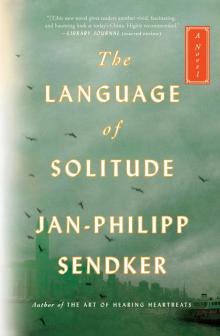 The Language of Solitude
The Language of Solitude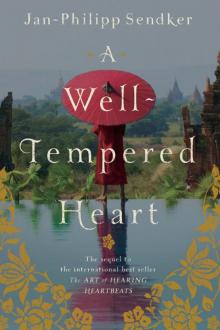 A Well-Tempered Heart
A Well-Tempered Heart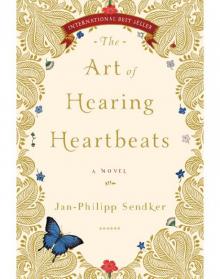 The Art of Hearing Heartbeats
The Art of Hearing Heartbeats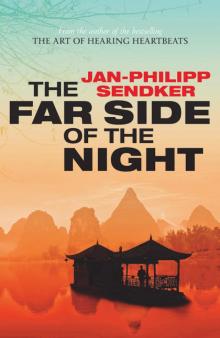 The Far Side of the Night
The Far Side of the Night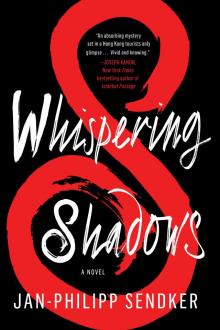 Whispering Shadows
Whispering Shadows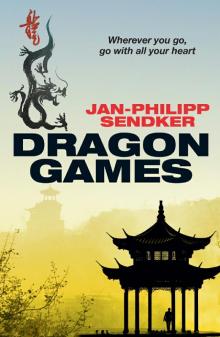 Dragon Games
Dragon Games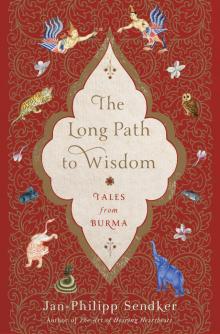 The Long Path to Wisdom
The Long Path to Wisdom